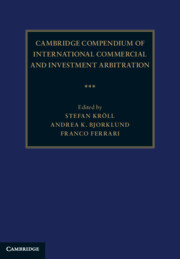Book contents
- Cambridge Compendium of International Commercial and Investment Arbitration
- Cambridge Compendium of International Commercial and Investment Arbitration
- Copyright page
- Contents
- Figures
- Tables
- Contributors
- Preface
- Part I Foundations
- Part II Public Law Questions Relating to Arbitration
- Part III Stakeholders in Arbitration
- Part IV Applicable Law
- Part V Jurisdiction of the Arbitrator
- Part VI The Arbitral Tribunal
- Part VII Procedural Questions in Arbitration
- 36 Implicit Consent and Unanticipated Risk in Class, Mass, and Collective Arbitration
- 37 The Principle of Equal Treatment in International Arbitration
- 38 Joinder of Third Parties
- 39 Evidentiary Issues in International Arbitration
- 40 Provisional Measures by Arbitrators and Emergency Arbitrators
- 41 Setting the Language (or Languages) of Arbitration – and the Impact of Language-Related Imperfections in Post-Award Proceedings
- Part VIII Role of State Courts in Arbitration
- Part IX Awards
- Part X Post-Award Issues
- Part XI Legal Concepts
- Part XII Areas of Concern
- Part XIII Arbitration and Related Fields
- Part XIV EU Law and Arbitration
38 - Joinder of Third Parties
from Part VII - Procedural Questions in Arbitration
Published online by Cambridge University Press: 18 February 2023
- Cambridge Compendium of International Commercial and Investment Arbitration
- Cambridge Compendium of International Commercial and Investment Arbitration
- Copyright page
- Contents
- Figures
- Tables
- Contributors
- Preface
- Part I Foundations
- Part II Public Law Questions Relating to Arbitration
- Part III Stakeholders in Arbitration
- Part IV Applicable Law
- Part V Jurisdiction of the Arbitrator
- Part VI The Arbitral Tribunal
- Part VII Procedural Questions in Arbitration
- 36 Implicit Consent and Unanticipated Risk in Class, Mass, and Collective Arbitration
- 37 The Principle of Equal Treatment in International Arbitration
- 38 Joinder of Third Parties
- 39 Evidentiary Issues in International Arbitration
- 40 Provisional Measures by Arbitrators and Emergency Arbitrators
- 41 Setting the Language (or Languages) of Arbitration – and the Impact of Language-Related Imperfections in Post-Award Proceedings
- Part VIII Role of State Courts in Arbitration
- Part IX Awards
- Part X Post-Award Issues
- Part XI Legal Concepts
- Part XII Areas of Concern
- Part XIII Arbitration and Related Fields
- Part XIV EU Law and Arbitration
Summary
Specific procedures for third-parties joinder in arbitration rules are now included in most institutional rules, and stands out as a key recent development in arbitration procedure. This development highlights the system’s responsiveness and versatility in addressing users’ new needs to respond to the changes in business practice, which has become more complex and involved more parties and transactions.
The chapter provides an overview and assessment of the most frequently used rules, in both commercial and investment arbitration, including under the ICC, LCIA, CIETAC, SIAC, HKIAC and UNCITRAL, in relation to third-parties joinder. These rules have addressed in a variety of ways the central issue of consent of the parties to arbitration, which is a key foundation of international arbitration.
Moreover, the rules have also sought to continue to implement the principles of equality and neutrality, which are fundamental to arbitration and key reasons why parties select to go to arbitration in the first place. Thus, while addressing demands for flexibility and reconfiguration of a bi-lateral into a more multi-lateral system, the rules have also tackled and resolved appropriately the key problem of providing the parties with an equitable way to appoint arbitrators of their own choosing.
Keywords
- Type
- Chapter
- Information
- Publisher: Cambridge University PressPrint publication year: 2023



